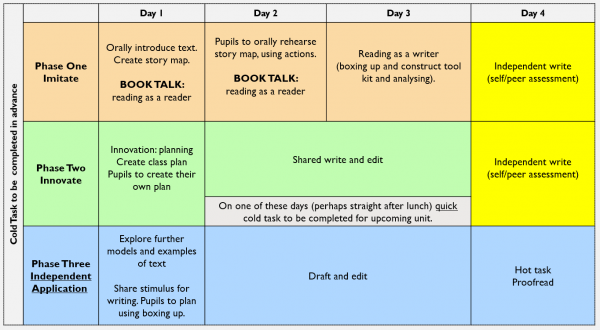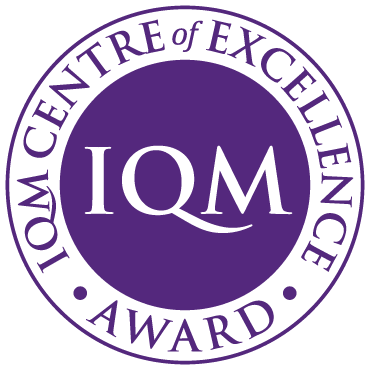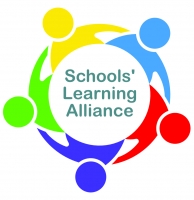Writing Strategy
Writing is not just a key aspect of the curriculum, but a key life skill. Along with reading and oracy (speaking, listening and understanding skills), it makes a significant contribution to the development of children as life-long thinkers and learners. We aim to ensure all children develop their writing ability and enjoy the process of cultivating this skill.
We teach writing explicitly through a consistent approach, but also weave the skill into the wider curriculum. We are training our young writers to be independent and skilled enough to enjoy writing for an endless range of purposes and audiences.
In the Early Years Foundation Stage and Year 1, our children complete their explicit writing teaching and learning through the Read Write Inc. programme. This programme is a Synthetic Systematic Phonics scheme; it is taught 5 times a week and incorporates: a sounds (phonics) session, a reading session and a Get Writing! session (children who start with us in EYFS will build up to this three-part session). For more information on the sounds and reading sessions, please see the Lambs Lane Primary School’s Reading Strategy.
Get Writing! forms the later part of the Read Write Inc. (RWI) session. All the writing they do in these sessions is linked to the core Storybooks and non-fiction books they have been studying in their reading sessions. By making this link between what they read and write, it allows them to naturally develop ideas and vocabulary.
Children write during every session, always rehearsing what they want to write before spelling the words using the graphemes (letter/sound formations) and the ‘tricky’ words they already know. This daily routine also allows for constant handwriting practice and tutoring. As well as practicing their letters and sounds in their writing, children also have ample time to work on their composition (ideas, vocabulary and grammar) by drawing on their own experiences and talking about the stories they read.
Here are some examples of the types of activities children complete during their Get Writing! time:
- Hold a sentence – remembering and then writing a sentence linked to the Storybook
- Edit - correcting errors in a sentence
- Write - writing about a picture from the Storybook, e.g. filling in a speech bubble or thought bubble from one of the characters, completing a 'wanted' poster or writing a simple recipe.
- ‘Fred talk and Red Rhythms’ for spelling (sounds and graphemes)
- Spelling check (partner work)
- Spelling tests
- Build a sentence – supporting children as they write a sentence
- Grammar and vocabulary tasks based on the storybook
- Write+ - more sophisticated writing frames that are used to inspire and support children as their writing ability increases
All children in EYFS and Year 1 are enrolled in Get Writing! as part of the RWI structure. Children in upper years can be enrolled and grouped alongside these children where their learning needs still sit within a Synthetic Systematic Phonics scheme.
Throughout EYFS and Year 1, children are also given plenty of opportunities to write in the wider curriculum. Often in the Early Years, writing activities will be set up to allow children to write around the theme they are currently working on, e.g., to write a shopping list when the class are looking at the local area, or to add some labels onto a picture of an alien when studying Space or to write a letter to a character in a book. In Year 1, longer writing will begin to be more focussed around the Creative Curriculum theme, e.g., a postcard from Cape Town after studying the main attractions of South Africa or a letter to Queen Victoria after studying some great leaders.
All children at Lambs Lane are encouraged to grow a love for writing, and to transfer all the skills they work on in their explicit writing lessons to their wider writing.
Once children are ready to move on from the RWI phonics programme, they begin their Talk 4 Writing journey. In Year 2 to Year 6, teachers plan their sequences of writing learning using a learning sequence based on the ‘Talk 4 Writing’ approach.
This approach to teaching writing is planned in genre-specific units. Prior to the unit beginning, children complete a ‘cold task’ – an attempt to write within a specific genre without any teaching. This ‘cold task’ allows teachers to understand the specific learning needs of their class and leads to a three-stage unit of pedagogy - the three stages are known as ‘imitation’, ‘innovation’ and ‘invention’:
- ‘imitation’ - where pupils learn and internalise a high-quality, age-appropriate model text. These texts are often connected to the wider curriculum or to carefully chosen class books. Within this section of learning, children identify transferrable ideas, vocabulary, writing skills and structures.
- ‘innovation’ - where pupils use the ideas and structures gained during the ‘imitation’ phase to co-construct new and improved versions of the model text with their teachers.
- ‘invention’ - where teachers help pupils to put all their learning into practice and produce independent, high-quality texts.
These stages aim to improve writing ability by giving children an understanding of the structure and elements of written language. Through fun activities and oral rehearsal, children internalise the text structures and language features their genre requires before putting pen to paper.
At the end of the three-week structure, children are given an opportunity to ‘hot write’ – complete a task where they show off all their newly acquired and practiced skills and vocabulary. This is a piece of work that every child can be proud of – it will show progress from the ‘cold task’. Throughout their time at the school, children are taught the skills they need to be able to draft, read, edit and re-draft their ‘hot writes’ independently and effectively.
Throughout the three-stage sequence of learning, children will cover a wide range of genres for an increasing list of specified purposes. In year 2, children will write ‘to inform’ and ‘to entertain’. In Year 3 and 4, children are extended ‘to persuade’ and in Year 5 and 6, children are also taught ‘to discuss’. This progression in purposes for writing follows our want to further the children’s cognitive development through working on new skills.
As well as following the three phases, we also set aside time for children to independently write in an extended and sustained way as often as possible (usually twice during each three-week structure). This gives our children the experience of writing for a longer period but most importantly allows them to constantly practice the skills they have learnt during other sequences of learning. We endeavour to make these independent writing opportunities fun and meaningful. Where possible they will link directly to our wider curriculum, giving the children a chance to combine their writing skills with the knowledge they are gaining. E.g., a few weeks after studying journalistic writing in detail, Year 5 may be given the task to write a newspaper article ‘to inform’ on the beginning of the Blitz in London.
Here is the structure of writing we keep to:

In years 5 and 6, some units of learning follow the three-week structure explained above. Often, this is the case when the children are coming across new genres of writing.
However, sometimes, units of writing in years 5 and 6 look a little different. They may (for instance) be shorter, with less time spent on the ‘innovation’ phase, and more time given over to the editing and improving stage. Or it may be the case that longer and more complex model texts do not allow for the ‘imitate’ phase to happen in the same way in does further down the school. For example, children may not be able to text map and internalise such huge sections of their text. The different approach we take in Upper Key Stage 2 is dependent on the children and intended to help prepare them for the secondary curriculum.
When children finish the RWI Phonics programme, they begin to work on their spelling using the RWI Spelling programme. This programme runs through to Year 6 and is suitable for all children in Years 2-6 who can read accurately with increasing speed (teachers will assess children’s readiness for this programme and their starting point within it). The RWI Spelling programme prepares children for the higher demands of the statutory spelling assessments but more importantly increases and broadens their vocabulary – which is vital for their reading and writing progress.
This spelling programme uses 15 minutes of daily teaching. The teaching of phoneme-grapheme correspondence underpins the programme. It also develops children’s knowledge of word families; how suffixes and prefixes impact upon root words; and provides mnemonics to help children remember the trickiest spellings.
The teaching revolves around instruction (with the help of fun online alien characters), partner and group practice, and competitive group challenges that help children commit unfamiliar words to memory.
Grammar and punctuation are taught through units of writing. Teachers identify grammar/punctuation needs through their daily assessment and ‘cold tasks’; adapt their three-week teaching programmes to match these. Often, lesson warm-ups/starters can be used as an effective way of linking grammar and punctuation learning needs to the text type currently being taught.
Grammar and punctuation naturally make up a large part of our success criteria for each unit of writing - our children come to understand that it is the foundation of all good and clear writing.
Grammar and punctuation understanding can be assessed explicitly against specific year-group grammar and punctuation objectives where teachers feel this is necessary. Resources are available for this.


